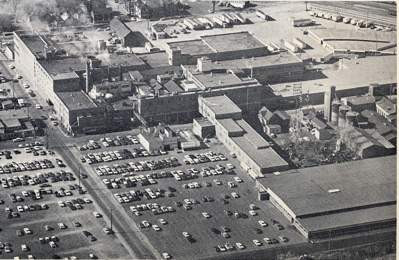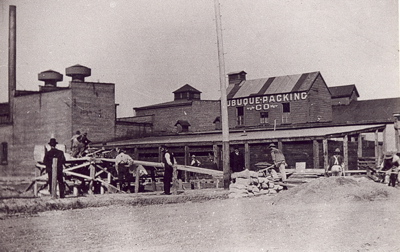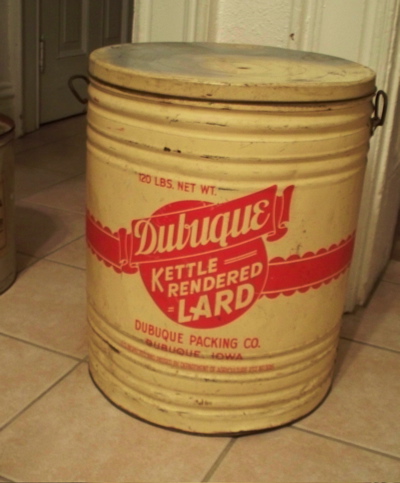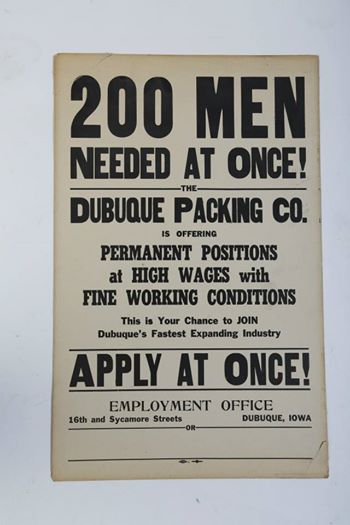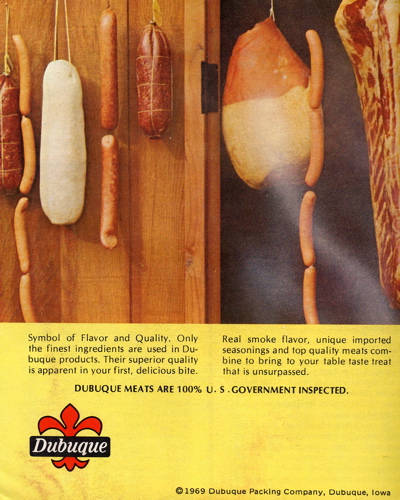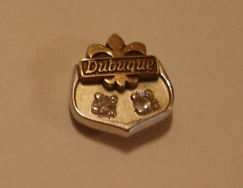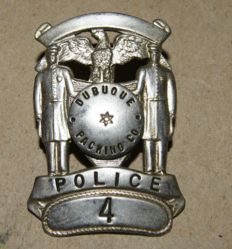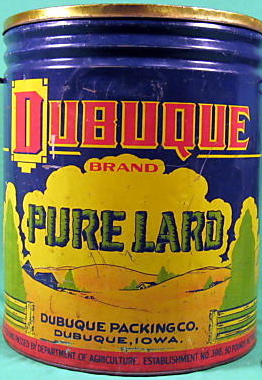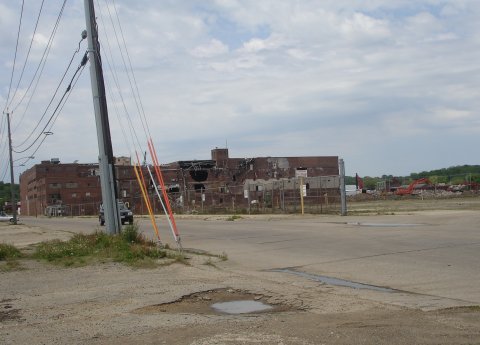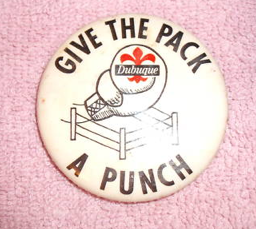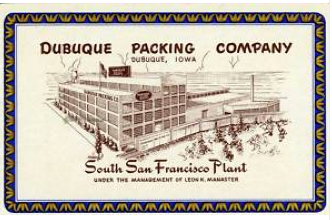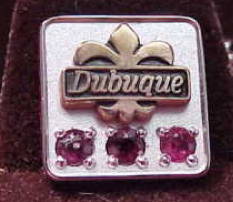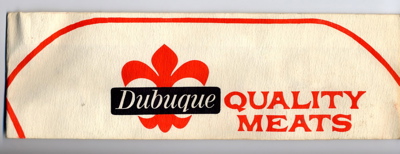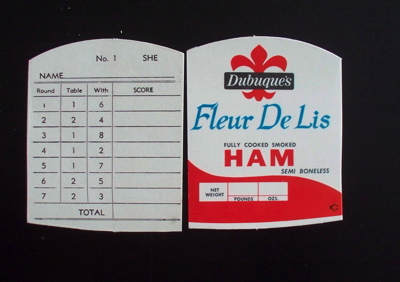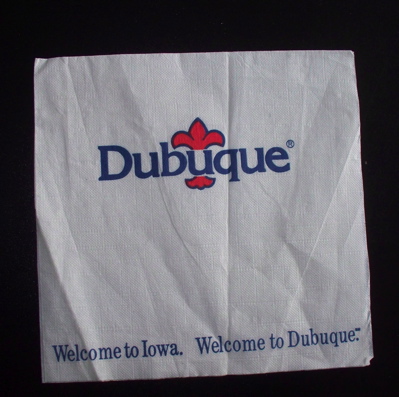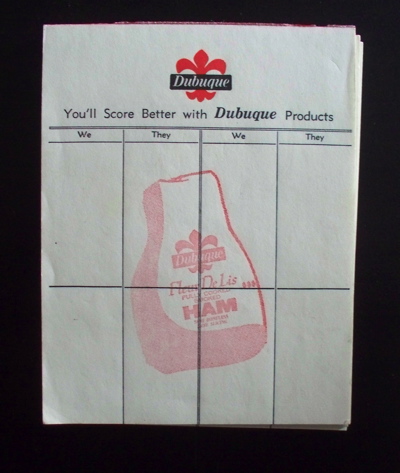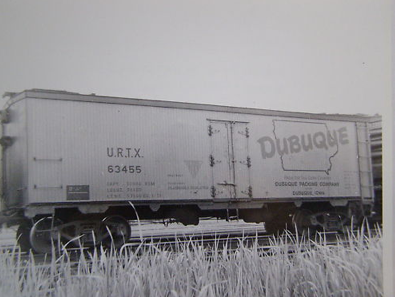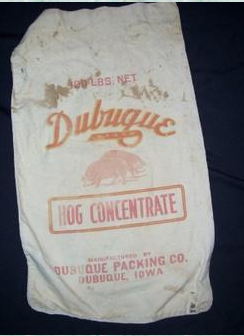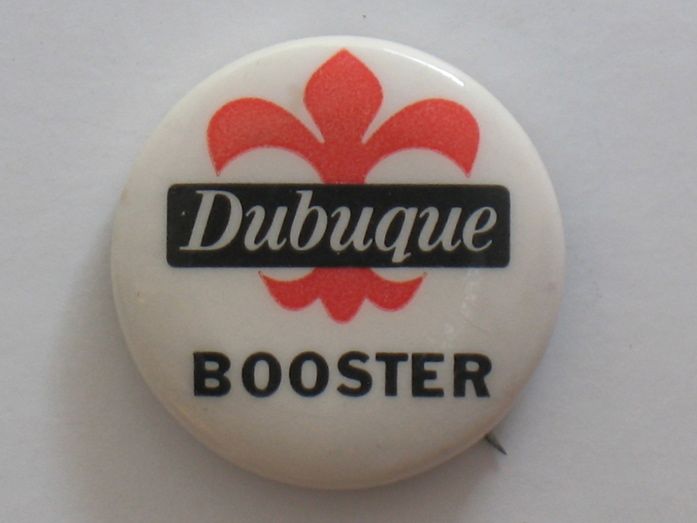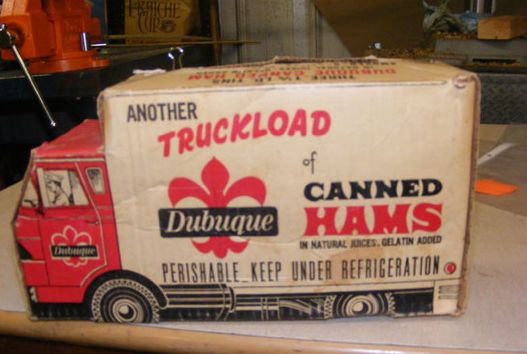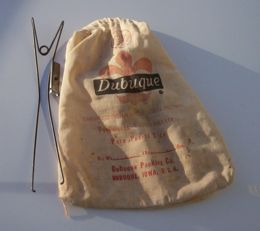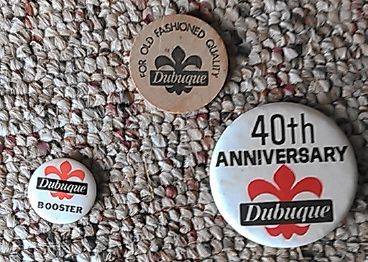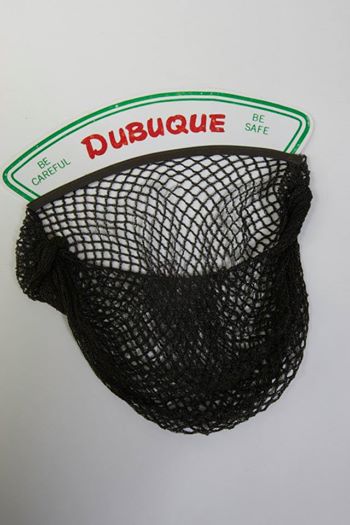Encyclopedia Dubuque
"Encyclopedia Dubuque is the online authority for all things Dubuque, written by the people who know the city best.”
Marshall Cohen—researcher and producer, CNN
Affiliated with the Local History Network of the State Historical Society of Iowa, and the Iowa Museum Association.
DUBUQUE PACKING COMPANY: Difference between revisions
No edit summary |
No edit summary |
||
| Line 36: | Line 36: | ||
In 1984 a district court ruled that the company had to pay full retirement benefits to eligible employees. When the company was sold, officials indicated that they wanted to take away some of the employees health, medical, and insurance benefits. The court ruled that the company should comply with an arbitrator's decision in 1983 and pay the fees of the attorney representing the union. (6) | In 1984 a district court ruled that the company had to pay full retirement benefits to eligible employees. When the company was sold, officials indicated that they wanted to take away some of the employees health, medical, and insurance benefits. The court ruled that the company should comply with an arbitrator's decision in 1983 and pay the fees of the attorney representing the union. (6) | ||
In 1985 the headquarters was moved to Omaha, Nebraska to be more centrally located to its other plants, which were processing primarily beef at that time. The company again flourished and was later sold in a leverage buyout to BeefAmerica, a firm controlled by Eli Jacobs. Its gelatin operations were sold to the French company Sanofi. BeefAmerica went out of business in 1998 following a recall and a strike. | |||
See: [[DUBUQUE HAM TV COMMERCIAL]] | See: [[DUBUQUE HAM TV COMMERCIAL]] | ||
Revision as of 00:59, 2 September 2015
DUBUQUE PACKING COMPANY. Once one of Dubuque's largest employers, the Dubuque Packing Company began with the merger in June 1891 of the Dubuque Butchers' Association and the Dubuque Packing and Provision Company. The new corporation, named the Dubuque Packing Company, began business on July 1, 1891, with a capitalization of $50,000. The directors were Charles J. W. SAUNDERS, C. Steiber, L. Reinecke, and Christian Schmidt.
In 1931 the local meat supplier was purchased by H. W. (HARRY) WAHLERT and St. Louis interests from the Christian Schmitt family for $180,000 when it employed only sixty people. The new firm was incorporated for $400,000 with $300,000 in common stock and $100,000 in preferred. (1) Harry Wahlert was the president, B. M. Paar was vice-president and treasurer, and Fred Krey of St. Louis was another vice-president. (2) Before its reopening, the plant underwent a massive renovation including the installation of special tables with "mono-metal" tops, extra windows, extra refrigeration, and the construction of rooms where hides and other inedibles were kept from separate from the other parts of the building. (3) Growing rapidly through the Great Depression, largely through Wahlert's guidance, "the Pack" produced canned hams, the first American food product to be exported after WORLD WAR II. Dubuque also became one of the largest producers of kosher meats in the United States.
By the 1950s, Dubuque Packing Company was the second largest employer in the city. In the 1960s the company's workforce reached 3,500. Annual sales in the 1970s supported a payroll of $20 million. The end of the 1970s saw thousands of people dependent on Dubuque Pack either directly or indirectly, and wages won through negotiations were among the highest paid in the city. In 1978 the company was listed in an issue of "Dun's Review" as the fifteenth largest private company in the United States. Annual sales were estimated at $796 million.
Other facts about the company were equally impressive. Dubuque Pack was the first United States producer to export food products, canned hams, to Italy following WORLD WAR II.
Canned hams produced by Dubuque Pack won the first gold medal for the best hams at the 1960 and 1961 California state fairs. During peak production, nine thousand hogs could be processed daily. A little known fact was that Dubuque Pack was one of the nation's largest producers of kosher meat. The address in 1941 for the meat market in Dubuque was 799 E. 16th.
In 1980 "the Pack" was a major force in the economy of Dubuque, one of nine cities nationwide in which the company had plants. Workers "on the line" earned an average of $25,000 in annual wages plus an additional $11,000 in fringe benefits according to company estimates. This included an average of five weeks of vacation per year.
In 1980 the company claimed to have lost $9.9 million primarily through its beef operations. Of the 115 men working in the beef kill, the youngest had 21 years of seniority resulting in a large number of benefits the company had to pay. The company wanted the production standard increased from 115.8 head of cattle per hour increased to 160. Union officials noted that with incentive pay, the workers were already slaughtering more than 115.8 but not 160. Union officials acknowledged that the company could build a one-story facility increasing efficiency over the five-story Dubuque plant were carcasses had to be moved from floor to floor. They also agreed that the company would probably gain from property tax concessions from any community near a new plant and that younger workers would cost less.
Blaming a changing market, high wages, and inefficient equipment, the company asked for wage and benefit concessions including a reduction of base pay from $10.69 to $9.00. When the union allowed a deadline to pass without voting on a previous wage-cut proposal, the company laid off 530 workers. Union officials charged the company with unfair labor practices and filed suit with the National Labor Relations Board. (4)
In April 1982, officials of Dubuque Packing Company announced they would close the Dubuque plant on October 16th. This action had the potential of creating unemployment for 1,200 workers and possibly raising Dubuque's unemployment rate to 17.3 percent.
On May 12, 1982 United Food and Commercial Workers Local 150-A members voted to reject the company's latest 11-point benefit and concessions package. Mel MAAS stated the workers "had enough and decided the company was going to close the plant regardless." After the vote was taken, company president Chuck Stoltz was nearly hit by an eleven gallon of dye as he walked from the headquarters. The concessions would have included a drop of base wages from $9.00 to $8.00, a loss of a week in vacation time, a limit on yearly vacations to three weeks, and an increase in worker payment of their medical insurance. (5)
News of the closing caught city officials by surprise. Union workers at the Pack had taken a 15.8 percent cut in pay and health insurance and given up some vacation time in October 1981 to keep the plant open. The City had given the company a 20 percent reduction in its property tax assessment on buildings in addition to a 38 percent reduction in its machinery assessment. Company officials would not discuss potential sale of the plant in the announcement.
In the fall of 1982, amid charges of union busting, the company sold the pork operation, Dubuque plant, and fleur-de-lis trademark to Robert Henry WAHLERT and the newly created FDL FOODS INC., for $30.5 million. The sale resulted in approximately five hundred employees being forced to accept lower wages or early retirement.
After the sale, Dubuque Packing Company moved its offices to the DUBUQUE BUILDING and kept a low news profile. Arguments continued with Local 150-A over health insurance and pension benefits.
In 1984 a district court ruled that the company had to pay full retirement benefits to eligible employees. When the company was sold, officials indicated that they wanted to take away some of the employees health, medical, and insurance benefits. The court ruled that the company should comply with an arbitrator's decision in 1983 and pay the fees of the attorney representing the union. (6)
In 1985 the headquarters was moved to Omaha, Nebraska to be more centrally located to its other plants, which were processing primarily beef at that time. The company again flourished and was later sold in a leverage buyout to BeefAmerica, a firm controlled by Eli Jacobs. Its gelatin operations were sold to the French company Sanofi. BeefAmerica went out of business in 1998 following a recall and a strike.
See: DUBUQUE HAM TV COMMERCIAL
---
Source:
1. "Packing Firm Incorporated for $400,000," Telegraph-Herald and Times-Journal, July 12, 1931, p. 4
2. Ibid.
3. "Dubuque Packing Company Plant is Scene of Great Activity," Dubuque Telegraph-Herald, November 1, 1931, p. 19
4. "Dubuque Pack Workers Agree to Wage-Cut Proposals," The Daily Reporter, October 20, 1981. Online: https://news.google.com/newspapers?nid=1907&dat=19811020&id=-mErAAAAIBAJ&sjid=idkEAAAAIBAJ&pg=1342,1129987&hl=en
5. "Dubuque Pack to Close," The Daily Reporter, May 12, 1982. Online: https://news.google.com/newspapers?nid=1907&dat=19820512&id=oWMrAAAAIBAJ&sjid=pdkEAAAAIBAJ&pg=2983,2256088&hl=en
6. "Retirement Benefits Settled," The Daily Reporter, April 27, 1984. Online: https://news.google.com/newspapers?nid=1907&dat=19840427&id=lGYrAAAAIBAJ&sjid=99gEAAAAIBAJ&pg=2893,2158783&hl=en
'The Pack" Changes. Quad City Times, July 20, 1980, p. 9a


